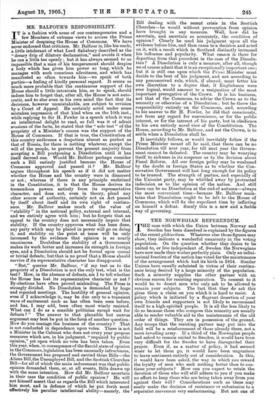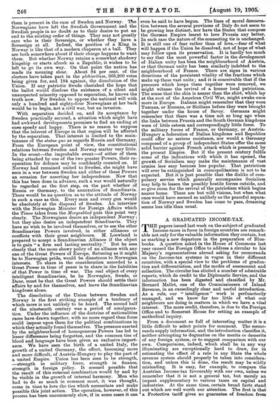THE NORWEGIAN REFERENDUM. T HE ease with which the Union between
Norway and Sweden has been dissolved is explained by the figures of the recent plebiscitum. Whatever else those figures may show, they indicate a wonderful unanimity in the voting population. On the question whether they desire to be united to, or live independent of, Sweden the Norwegians have now made their wishes perfectly plain. Only an infini- tesimal fraction of the nation has voted for the maintenance of the arrangement which had its birth in 1814. Similar Unions have usually subsisted in virtue of their continu- ance being desired by a large minority of the population. Such a minority supplies the other partner with an obvious reason for resisting separation. To consent to it would be to desert men who only ask to be allowed to remain your subjects. The fact that they do ask this gives them a claim on you which it is hard to resist. A policy which is initiated by a flagrant desertion of your own friends and supporters is not likely to recommend itself to a high-spirited people. It is all the less likely to do so because those who compose this minority are usually able to render valuable aid to the maintenance of the old order of things. They are in possession of the ground. Any troops that the resisting partner may put into the field will be a reinforcement of those already there, not a mere invading army. If a third of the Norwegian people had asked to remain united to Sweden, it would have been very difficult for the Swedes to have disregarded their prayer. Even if, as a matter of policy, it had seemed wiser to let them go, it would have been ungracious to leave sentiment entirely out of consideration. Is this, it would have been asked, the way in which you reward the loyalty of men who seek nothing better than to con- tinue your subjects ? How ca.n you expect to retain the devotion of those who will still adhere to you if you make no effort to keep those who are being taken away from you against their will ? Considerations such as these may easily make the decision of resistance or submission to a separatist movement very embarrassing. But not one of them is present in the case of Sweden and Norway. The Norwegians have left the Swedish Government and the Swedish people in no doubt as to their desire to put an end to the existing order of things. They may not greatly care who is their Sovereign, or whether they have a Sovereign at all. Indeed, the position of a King in Norway is like that of a modern chaperon at a ball. They are both somewhere about if their charge happens to want them. But whether Norway retains a somewhat shadowy kingship or starts afresh as a Republic, it wishes to be left to go its own way. On that point the nation has made its meaning clear. About 84 per cent. of the electors have taken part in the plebiscitum, 368,200 votes being given for, and 184 against, the dissolution of the Union. If any patriotic Swede cherished the hope that the ballot would disclose the existence of a silent and unsuspected minority opposed to separation, he knows the truth now. For Sweden to oppose the national will with only a hundred and eighty-four Norwegians at her back would be to begin, not a civil war, but an invasion.
With separation decided on, and its acceptance by Sweden practically secured, a situation which might have had awkward developments promises to find an ending at onee speedy and happy. There is no reason to suppose that the interest of Europe in that region will be affected by the separation. That interest is limited to the main- tenance of the status quo as regards Russia and Germany. From the European point of view, the constitutional relations between Sweden and Norway matter very little. In the event—the improbable event—of either of them being attacked by one of the two greater Powers, their co- operation for defence may be confidently counted on. If Norway had remained united to Sweden, she might have seen in a war between Sweden and either of these Powers an occasion for asserting her independence. Now that this has been done in advance, such a war would naturally be regarded as the first step, on the part whether of Russia or Germany, to the annexation of Scandinavia. There would be no question as to the attitude of Norway in such a case as this. Every man and every gun would be absolutely at the disposal of Sweden. An interview with the Norwegian Minister for Foreign Affairs which the Times takes from the Morgenblad puts this point very clearly. The Norwegians desire an independent Norway ; but they also desire an independent Scandinavia. They have no wish to be involved themselves, or to see the other Scandinavian Powers involved, in either alliances or conflicts with their great neighbours. M. Loewland is prepared to accept a Scandinavian Alliance if the object is to gain "a firm and lasting neutrality." But he sees clearly that the more showy policy of an alliance with any one of the Great Powers of Europe, flattering as it might be to Norwegian pride, would be disastrous to Norwegian interests. To share in the consideration accorded to a Great Power in time of peace is to share in the liabilities of that Power in time of war. The real object of every intelligent Scandinavian, be he Norwegian, Swede, or Dane, must be that the Great Powers should settle their affairs by and for themselves, and leave the Scandinavian kingdoms alone.
The dissolution of the Union between Sweden and Norway is the first striking example of a tendency of which more is not unlikely to be heard. The second half of the nineteenth century was a period of amalgama- tion. Under the influence of the doctrine of nationalities races have drawn together, with no more regard than force could impose upon them for the political combinations in which they actually found themselves. The pressure exerted by the neighbourhood of homogeneous Powers has led to lesser differences being forgotten, and the common ties of blood and language have been given an exclusive import- ance. We have seen the birth of a united Italy, the growth of a united Germany, the effort, becoming more and more difficult, of Austria-Hungary to play the part of a united Empire. Union has been seen to be strength, —strength in military force, strength in finance, strength in foreign policy. It seemed possible that the result of this external combination would by and by be visible in the growth of internal harmony. Men who had to do so much in common must, it was thought, come in time to love the ties which necessitate and make possible this joint action. The operation, however, of this process has been uncommonly slow, if in some cases it can even be said to have begun. The lines of moral demarca- tion between the several provinces of Italy do not seem to be growing less distinct, nor have the States that compose the German Empire learnt to love Prussia any better. In each case the nature of the connecting tie is unchanged. It is still one of fear rather than of love,—fear of what will happen if the Union be dissolved, not of hope of what may follow upon its preservation. It is hardly too much to say that the most powerful factor in the development of . Italian unity has been the neighbourhood of Austria, or that German unity has been similarly indebted to the neighbourhood of France. There are signs in various directions of the persistent vitality of the fractions which make up these vast units ; and it is conceivable that if the pressure which keeps them together were removed, we might witness the revival of a keener local patriotism. The sense that the skin is nearer than the shirt, which lay at the root of the American Civil War, might awake once more in Europe. Italians might remember that they were Tuscans, or Romans, or Sicilians before they were brought together under the house of Savoy. Germans might remember that there was a time not so long ago when the links between Prussia and the South German kingdoms were of little esteem and correspondingly little force. To the military forces of France, or Germany, or Austria- Hungary a federation of Italian kingdoms and Republics could offer no serious resistance, nor would a Germany composed of a group of independent States offer the same solid barrier against French attack which is presented by the present Empire. But if the present century fulfils some of the indications with which it has opened, the growth of Socialism may make the maintenance of vast armies less easy because less popular. That patriotism will ever be extinguished in cosmopolitanism is not to be expected. But it is just possible that the dislike of com- pulsory service which generally accompanies Socialism may help to lessen the possibly hostile forces outside, and so give room for the revival of the patriotism which begins nearer home. These are but wild visions, but when what once would have seemed so unlikely as the peaceful separa- tion of Norway and Sweden has come to pass, dreaming seems less idle than usual.



































 Previous page
Previous page